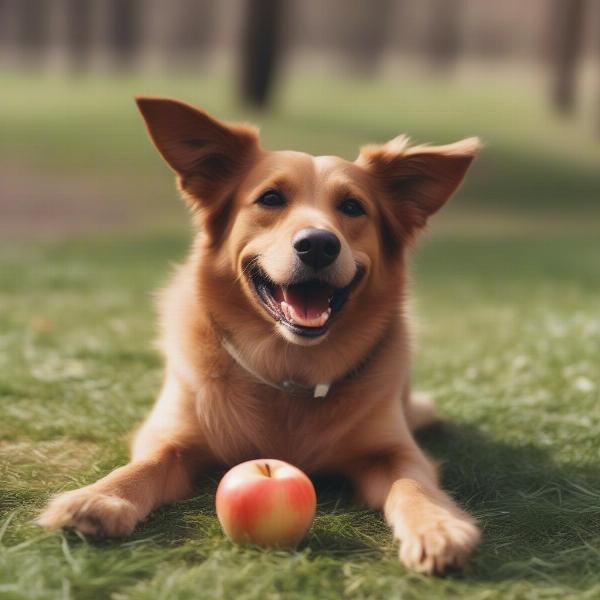Jello is a popular dessert loved by many, but is it safe for our furry friends? The simple answer is: it depends. While plain, sugar-free gelatin isn’t inherently toxic to dogs, it offers no nutritional value and can even be harmful in certain situations. This article will delve into the details of whether jello is good for dogs, the potential risks, and safer alternatives to satisfy your dog’s sweet tooth.
Understanding Gelatin: The Base of Jello
Jello is primarily made from gelatin, a protein derived from collagen extracted from animal bones, skin, and connective tissues. In small amounts, plain gelatin can even be beneficial for dogs, supporting joint health and digestion. However, the problem with jello for dogs lies in the added ingredients.
The Dangers of Sweetened and Artificially Flavored Jello
Most commercially available jello contains high amounts of sugar, artificial sweeteners (like xylitol), and artificial flavors and colors. These additives can pose serious health risks to dogs.
Sugar and Artificial Sweeteners: A Toxic Combination
- Sugar: Excessive sugar intake can lead to weight gain, dental problems, and even diabetes in dogs.
- Xylitol: This artificial sweetener is particularly dangerous for dogs, causing a rapid release of insulin which can lead to liver failure and even death. Even small amounts of xylitol can be fatal.
Artificial Flavors and Colors: Potential Allergens and Irritants
Artificial flavors and colors can cause allergic reactions in some dogs, leading to skin irritation, digestive upset, and other issues. These additives offer no nutritional benefit and can be harmful in the long run.
Can Dogs Eat Sugar-Free Jello?
While sugar-free jello might seem like a safer option, it often contains artificial sweeteners like xylitol. As mentioned earlier, xylitol is extremely toxic to dogs. Always check the ingredients list carefully before giving any type of jello to your dog. If it contains xylitol, avoid it completely.
What to Do if Your Dog Eats Jello
If your dog accidentally consumes a small amount of jello that doesn’t contain xylitol, they’ll likely be fine. Monitor them for any signs of digestive upset, such as vomiting or diarrhea. However, if your dog ingests jello containing xylitol, contact your veterinarian immediately.
Healthier Alternatives to Jello for Dogs
Instead of risking your dog’s health with jello, opt for healthier treats that are specifically designed for canine consumption. There are numerous dog-friendly treats available on the market, including:
- Fruits and Vegetables: Offer small pieces of dog-safe fruits like apples (without seeds or core), bananas, and blueberries. Vegetables like carrots and cucumbers can also be a healthy snack.
- Plain Yogurt (Unsweetened): Plain, unsweetened yogurt can be a good source of probiotics and calcium.
- Dog-Specific Treats: Choose treats made with natural ingredients and avoid those with added sugars, artificial sweeteners, and artificial colors.
 Dog enjoying healthy treats like fruits and vegetables
Dog enjoying healthy treats like fruits and vegetables
When to Consult a Veterinarian
If your dog exhibits any unusual symptoms after consuming jello, consult your veterinarian immediately. Symptoms to watch out for include:
- Vomiting
- Diarrhea
- Lethargy
- Loss of appetite
- Seizures
Is Homemade Jello Safe for Dogs?
Even homemade jello can be risky if it contains ingredients harmful to dogs. Some recipes may include sweeteners or other components that are toxic. If you’re considering making homemade jello for your dog, consult your veterinarian for a safe recipe and appropriate portion sizes.
Conclusion
While plain, unsweetened gelatin is not inherently toxic, the added ingredients in most commercially available jello make it an unsuitable treat for dogs. The risks associated with sugar, artificial sweeteners like xylitol, and artificial flavors and colors outweigh any potential benefits. Choose healthier alternatives to satisfy your dog’s cravings and ensure their well-being.
FAQ
- Can I give my dog a small lick of jello? It’s best to avoid giving your dog any jello, even a small lick, especially if it contains sugar or artificial sweeteners.
- What should I do if my dog eats sugar-free jello? Contact your veterinarian immediately, as sugar-free jello often contains xylitol, which is toxic to dogs.
- Are there any types of jello that are safe for dogs? No, it’s best to avoid giving your dog any type of jello.
- What are some healthy treats I can give my dog instead of jello? Dog-safe fruits, vegetables, plain unsweetened yogurt, and dog-specific treats made with natural ingredients are healthier alternatives.
- What are the signs of xylitol poisoning in dogs? Symptoms include vomiting, weakness, lethargy, loss of coordination, seizures, and liver failure.
- Can gelatin be good for dogs? Plain, unflavored gelatin in small amounts can be beneficial for joint health, but it’s important to consult your veterinarian before adding it to your dog’s diet.
- Is it safe to make homemade jello for my dog? Consult with your veterinarian before making homemade jello for your dog, as some ingredients may be harmful.
ILM Dog is your go-to resource for expert advice on dog care and wellbeing. We offer a wealth of information on dog breeds, health, training, nutrition, grooming, and much more. For tailored guidance on your dog’s specific needs, connect with us via email at [email protected] or call us at +44 20-3965-8624. Visit ILM Dog for more expert tips and resources.